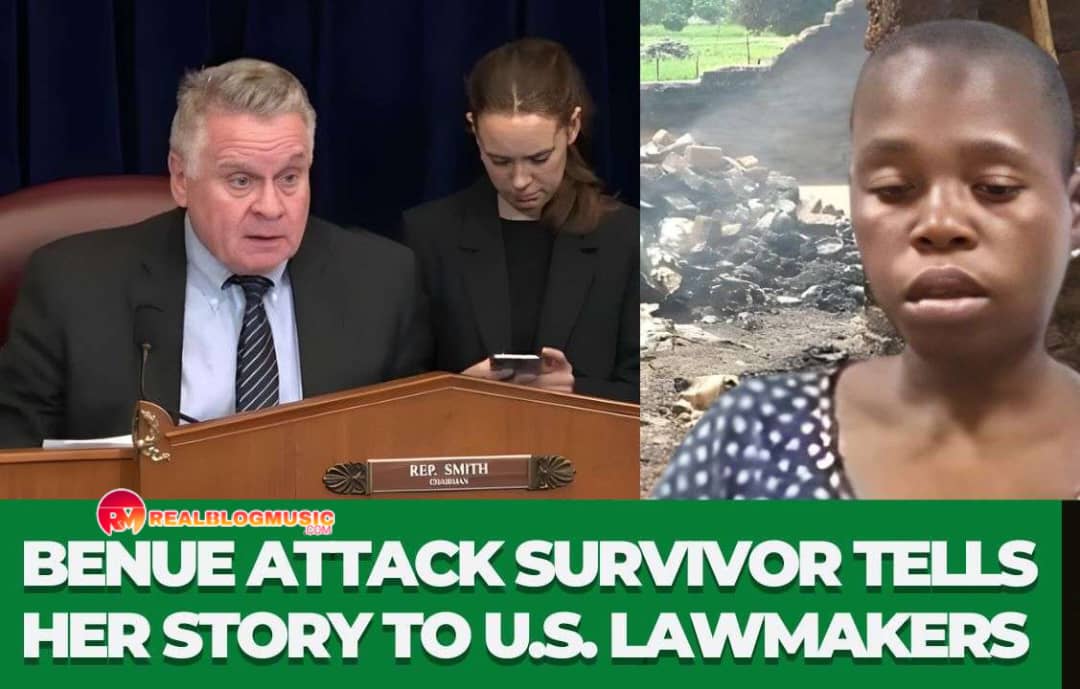
The global spotlight has once again turned toward Nigeria’s security challenges as a courageous survivor of the Yelwata attack in Benue State has stepped forward to share her story before U.S. lawmakers. Her testimony, delivered during a special congressional briefing in Washington, has intensified conversations around human rights, rural violence, and government accountability in Nigeria.
The survivor, whose identity has been partially withheld for safety reasons, recounted the horrifying events that unfolded in Yelwata—a community repeatedly targeted by violent attacks. According to her testimony, the night of the incident began like any other until sudden gunfire erupted, throwing the entire village into chaos. Families fled into the darkness, homes were set ablaze, and countless lives were instantly shattered.
Speaking through trembling words and visible emotion, she told U.S. Congress members how she watched neighbors fall, how families were separated while trying to escape, and how children cried out in fear as armed attackers stormed through the settlement. Her story painted a harrowing picture of the suffering faced by many rural communities in Nigeria’s Middle Belt.
The session, attended by influential policymakers, human rights groups, and global observers, was part of a wider congressional inquiry into religious freedom, ethnic violence, and security deterioration in Nigeria. Her testimony—raw, unfiltered, and painfully honest—offered a firsthand account of the tragedies that statistics alone fail to capture.
Lawmakers listened intently as she described the aftermath of the attack. Survivors, she said, were forced to flee with nothing but the clothes on their backs. Many now live in overcrowded IDP camps with limited access to food, water, healthcare, and education. She emphasized that lack of protection forces families to live in constant fear, especially as many of the displaced want to return home but feel unsafe due to repeated attacks in the region.
During her statement, she made a passionate appeal for international support and intervention, urging the U.S. government to use its influence to push for stronger security measures, accountability, and humanitarian assistance for affected Nigerian communities. She stressed that without action, more villages risk suffering the same fate as Yelwata.
The testimony has already triggered reactions across various global media platforms and Nigerian social circles. Human rights organizations have praised her bravery for speaking out despite personal risk. For them, her story represents thousands of unheard voices—men, women, and children whose lives have been forever altered by violence that rarely receives sustained global attention.
Meanwhile, in Nigeria, the issue has sparked renewed conversations about the government’s capacity to protect vulnerable communities. Critics argue that persistent attacks across Benue, Kaduna, Plateau, Taraba, Zamfara, and other states indicate systemic lapses in coordination, intelligence gathering, and rapid response. Many believe the survivor’s testimony has placed Nigeria under fresh scrutiny, compelling international bodies to monitor the country’s security challenges more closely.
Supporters of the government, however, maintain that security agencies are making progress and need more time and resources to fully stabilize troubled regions. They argue that complex factors—including land disputes, farmer-herder clashes, and armed banditry—require long-term solutions rather than quick fixes.
Regardless of political viewpoints, one thing is clear: the survivor’s voice has struck a chord globally. Her testimony has humanized the statistics and brought renewed urgency to Nigeria’s insecurity crisis. Analysts believe her appearance before Congress could inspire diplomatic pressure, increased humanitarian aid, and stronger monitoring of Nigeria’s human rights situation.
As the world reflects on her heartbreaking account, many are calling for a united effort—both locally and internationally—to rebuild affected communities, strengthen early warning systems, and ensure that tragedies like the Yelwata attack are never repeated.
Her bravery has sparked a new wave of awareness. And for survivors across Benue and beyond, her voice may finally be the one that brings change.
